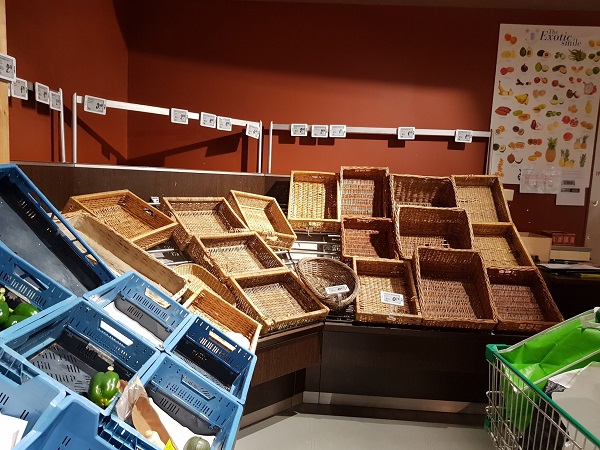 My local supermarket on Friday afternoon;
Credit: Jazmin Campbell
My local supermarket on Friday afternoon;
Credit: Jazmin Campbell
Toilet paper. Soap. Hand sanitiser. Three everyday products which I, along with many others, often take for granted. That is, until recently when panic over the COVID-19 (coronavirus) pandemic pervaded the aisles of local supermarkets and pharmacies. We’ve surely all witnessed this widespread phenomenon of panic buying: what started off with supermarket shelves empty of hand soap and toilet roll (an ongoing mystery in relation to a respiratory disease) has escalated into people queueing outside the shops as soon as they open to stock up on grain products like rice and pasta, potatoes, meat, fresh (and frozen) fruit and veg… Onlookers could be forgiven for thinking that the supermarkets were all closing down for good, when in fact it’s pretty much business as usual.
That is not to say that the coronavirus threat is not real. Of course, we should collectively be more cautious, being sure to wash our hands regularly and thoroughly with soap and water (something I would hope everyone had been doing even before COVID-19) and avoiding crowds of people whenever possible, especially when displaying symptoms of the disease – although again this should be common practice when one’s sick, whether it’s the seasonal flu or coronavirus. But perhaps those people who are stockpiling goods (and don’t even get me started on those who have been taking face masks and hand sanitisers from hospitals) should think about leaving something for the most vulnerable members of society, such as the elderly and those with weaker immune systems, who are most at risk if they contract the disease. Indeed, it is only by working together that we can contain the spread of coronavirus and give our extraordinarily hardworking health professionals the much-needed gift of time to develop and provide treatment and potential vaccinations.
At the time of writing, the number of confirmed cases of COVID-19 in Luxembourg has reached 51 (up from the 38 reported on Friday). The disease has already claimed one life at the national level: that of a 94-year-old man. And these are just the official statistics, with many more tests being carried out in recent days, primarily on those displaying the severest of symptoms.
Considering the accelerated spread of coronavirus, both within and beyond national borders, Luxembourg’s authorities recently decided to implement a series of strict(er) measures similar to its neighbours and other European countries. Such measures are highly important, not least in a small landlocked country like the Grand Duchy, which shares borders with several other nations and whose economy (and healthcare system) relies heavily on cross-border workers. In fact, as Prime Minister Xavier Bettel recently pointed out, around 70% of Luxembourg’s hospital staff live in France. Closing borders is thus not a viable option.
Indeed, it can’t be easy for a government to find solutions which protect both the health of its citizens / residents and the economy. Luxembourg’s Health Ministry initially issued recommendations concerning no handshake or kissing greetings, avoiding touching your face with your hands and, of course, correct handwashing techniques. As national cases have continued to rise in recent days and weeks, the authorities have gone from recommending the cancellation or postponement of large events to outright banning indoor events with more than 100 (previously 1,000) people and outdoor events involving over 500 people. The schools will be closed from Monday, as will many other establishments including museums, libraries, cinemas and concert halls. Indoor public spaces such as restaurants and bars are obliged to control and limit the number of people entering (maximum 100). Companies are encouraged to allow employees to work from home, where possible. Bus services have been reduced outside of peak times, the front rows should be left empty and barriers have been put in place to maintain a safe distance between bus drivers and passengers, with the latter no longer permitted to get on or off the bus via the front doors, at least for the time being.
Such measures are in line with those being implemented in other countries, including France, Belgium, Ireland, Austria, Greece, Portugal, Slovenia and Denmark (among others), where schools have been closed and large events cancelled or postponed. Although Luxembourg’s action plan is ahead of other countries like the UK, whose schools remain open at present, they fall short of those taken in countries like the Czech Republic, where schools closed already last week and events with more than 30 people have been banned, and Italy, the hardest hit European country and second worst-hit worldwide after China, where the first COVID-19 cases were reported back in December. In the context of a nationwide lockdown, only supermarkets and pharmacies currently remain open as part of the Italian authorities’ efforts to contain the virus. Meanwhile, the US recently announced its decision to ban flights to and from Schengen countries in Europe (possibly extending to the UK and Ireland in the near future).
Moving away from public health to the economic perspective of this pandemic, the hospitality, entertainment, sport, travel and tourism sectors are among those most negatively affected. Just look at the collapse of UK airline FlyBe, whose existing financial problems were exacerbated by the COVID-19 outbreak. Nevertheless, as in an economic downturn, some sectors may be more positively impacted, particularly the retail sector (plus its supply chain, including transport) as people stock up. Despite my negative comments about panic buying (which I stand by), increased demand may see increased staff numbers in supermarkets. On the other hand, as more and more people stay at home over the next fortnight, the sales of clothes and other non-essential items may well decline, potentially leaving various businesses in financial difficulty and negatively impacting the national economy overall.
To help limit the impact of the coronavirus outbreak on the economy, the Luxembourg government recently approved a new financial aid scheme for small and medium-sized enterprises (SMEs), while the Chamber of Commerce yesterday announced the availability of loans of up to €250,000 for companies affected by the pandemic. Whether such measures will be enough to offset the economic damage caused by this crisis remains to be seen.
In any case, while I certainly see the importance of both the health and economic perspectives, especially in supporting smaller local businesses at this difficult time, public health should be the main concern right now. It is up to all of us to do our part in containing this virus and its impact on the most vulnerable members of society by following the health authorities’ recommendations and, where necessary, taking additional precautions, such as limiting social contact – even if this means cancelling trips or events which have not already been cancelled, working remotely (very grateful that I already mostly work from home) or taking the available leave to stay home with children who are now off school. At the end of the day, health is one of the most (if not the most) important aspects of our lives and if a few personal sacrifices are needed in the short-term for the sake of our own well-being and that of others, so be it.









